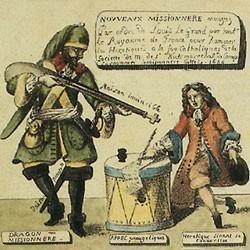- The Consuls’ bridge
It offers a view of the Lagarrigue ravine, a natural fortification of Montauban (cf. above Quai Montmurat). This bridge was not built until the 19th century. The square was previously closed on the ravine side by houses. It is on this square that successively the temple of the School and the old temple were found. It was here that the clash of the 10th of May, 1791, took place between the national guards (mostly Protestant patriots) and a royalist and Catholic population, which resulted in the death of 5 guards and the imprisonment of 55 men, later freed on the intervention of the Bordeaux guard.
- The School temple
This site, now the café de la Comédie, was awarded to the Protestants to replace the one where they met «soubs la couvert de la grande Place» (under cover of the Grand Place) (the present Place Nationale).
- The old temple
The uncertainty involved in the places of worship led to the construction, in 1609, of a new temple called Temple neuf, then Temple vieux after the construction of the temple of the Place du Coq (see No. 5). The Old Temple was demolished on the proposal of Intendant Foucault, by virtue of a decree of the parliament of Toulouse of June the 2nd, 1683 which gave three days to the religionaries to demolish the temple. The reason for this decision was that the pastor had admitted «new converts» to the Holy Supper. When the deadline expired, Foucault ordered the demolition. There was therefore no more temple in Montauban. The literal application of the edict of Nantes resulted in the prohibition of Protestant worship, the banishment of pastors, the suppression of Protestant civil status. These functions could be performed in Villemade, a locality located 10 km from Montauban. In addition, a special regime was set up by Foucault in 1684 for baptisms. A plaque on the wall of the theatre, next to the elevator, recalls the day: the 10th of May, 1791.


